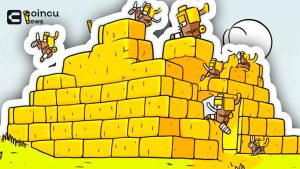DEUS Finance’s Algorithmic Stablecoin Loses Its Dollar Peg, Falling 30%.
According to Coincu data, DEI, a hybrid algorithmic stablecoin from the DeFi protocol DEUS Finance, lost its dollar peg on Sunday.

After recovering from an all-time low of $0.55 on May 16, the DEI stablecoin is now trading at $0.66.
DEUS Finance’s stablecoin, although similar to Terra’s UST in many aspects, is collateralized (unlike UST).
DEUS and DEI are the two tokens used by Deus Finance. The first is the project’s native governance token, while the second is a stablecoin pegged to the US dollar.
By putting $1 as collateral, users can always mint 1 DEI. Circle’s USDC, Fantom FTM, MakerDAO’s stablecoin DAI, WBTC (the wrapped version of Bitcoin), or a mix of DEUS and USDC can be used as collateral. The USDC and native token DEUS have a 80% collateral ratio.
DEI’s dollar peg is stabilized similarly to Terra’s UST, using a mint-and-burn system similar to DEUS and DEI.
During DEI minting, the DEUS collateral is burned (a process of removing the tokens from the circulation) unless a different form of collateral is used (such as USDC, FTM, or WBTC, for example). When redeeming DEI for the underlying collateral, DEUS tokens are also minted alongside the underlying collateral.

If you were to mint DEI with only USDC as collateral, for example, you would receive 80% USDC and 20% DEUS when you redeemed your underlying.
The process of exchanging the stablecoin for its collateral is known as redemption.
If the price of DEI is more than $1, users can mint 1 DEI with $1 worth of collateral and sell them in the market to profit.
Users can acquire one DEI for less than a dollar on the open market and redeem them for $1 worth of collateral in USDC and DEUS if DEI falls below a dollar.
The DEUS Finance ecosystem has been hit by two flash loan attacks in the last two months, resulting in a loss of more than $30 million.
DISCLAIMER: The Information on this website is provided as general market commentary and does not constitute investment advice. We encourage you to do your own research before investing.
Join CoinCu Telegram to keep track of news: https://t.me/coincunews
Follow CoinCu Youtube Channel | Follow CoinCu Facebook page
Patrick
CoinCu News



















